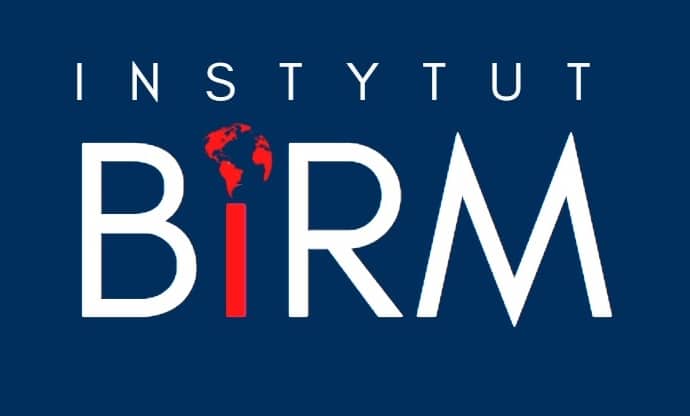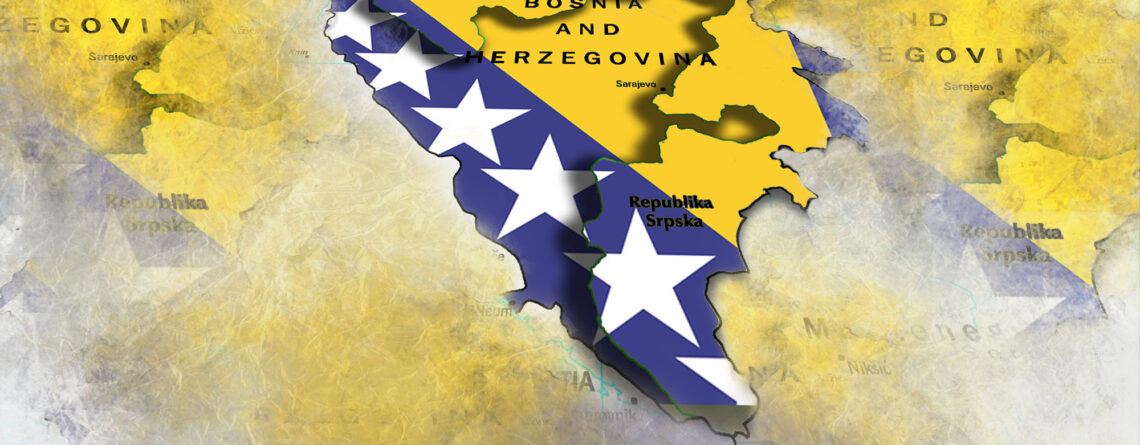Russian war in Ukraine in Bosnia and Herzegovina’s mirror
Michał Kucharski2022-10-27T09:02:35+02:00The war in Ukraine caused a series of conflicting reactions from local societies and politicians in the Balkans, especially in Bosnia and Herzegovina.
In the fall of 2021, Bosnia and Herzegovina (BiH) was recognized by many politicians as the main flash point in Europe. The tension between the individual constitutive nations (Bosniaks, Croats and Serbs) was very serious. When asked about their moods in October 2021, the people of Sarajevo considered the new civil war one of the more serious possibilities. I mean both the media reports and the conversations with friends at that time. The direct cause of such opinions was the growing paralysis of federal institutions. Milorad Dodik, the formal leader of the Serbian community and her representative in the BiH Presidency, refused to attend the meetings of this three-person body. His attitude paralyzes decision-making processes throughout the country. This is because the operation of the Bureau requires consensus. Even if it was difficult to achieve in previous years, none of the politicians boycotted the meetings, as Dodik does. An additional problem is the fact that the Bureau plays an important role in international politics. Without the cooperation of three members of this body, it is difficult to find a coherent image outside and maintain trust in relations with partners in the region or the European Union.
Dodik also plays a key role in Republika Srpska (a component of Bosnia and Herzegovina and not the Republic of Serbia, i.e. a separate state), although formally he does not sit on any of its bodies. At the beginning of December 2021, the National Assembly of Republika Srpska, its autonomous parliament, decided to exclude the Republic (RS) from some of its common policies. However, it did not bring about another war, but only shifted the boundary of the tension that was being built. Looking for the international context of the events described above, it is worth quoting the opinion of a well-known political scientist, prof. Dejan Jovic, who in the same month (December 2021) indicated that one of the causes of the war in the 1990s was the collapse of the then world order. The end of the Cold War changed the priorities of the United States and the later European Union and favored new conflicts – many weapons remained, and a new order had not yet been formed (Jović, 2021). Russia’s full aggression against Ukraine is also such a disorder of the world order. It should be emphasized, however, that the specter of Russian aggression in Ukraine was very distant for most Balkan commentators. They did not expect it, and the presence of Serbian volunteers in the ranks of Donbas separatists also ceased to be an important factor in the analyzes. Despite the fact that Putin’s support for Dodik is one of the key elements that gives the Serbian politician a sense of strength in internal relations. There is also no doubt that a quick victory for the Kremlin would encourage RS to take further, more decisive steps towards breaking with Sarajevo. The attitude of the EU and the US would be of key importance to him, which, despite their defeats in the Balkans, are still considered a guarantor of stability (which was confirmed in the case of the dispute over travel documents between Kosovo and Serbia). In the absence of a firm defense of Ukraine on the part of Western partners, Dodik would assume that the Republika Srpska would not have to fear foreign support in equipment for the federal government in Sarajevo. Both the earlier actions of the separatists in eastern Ukraine, the detachment of Crimea and the independence referendum in Catalonia were an occasion for him to declare the need for talks on the status of Republika Srpska. Anyway, today RS functions as a separate state in terms of the economy. To this must be added unilateral declarations about a flag, a national holiday, etc. Milorad Dodik is constantly pushing the boundaries, testing what he can afford, and has so far not suffered any serious consequences from his actions.
However, the attitude of the EU and the USA towards Ukraine cooled his aspirations. The war in Ukraine initially pushed the conflict in Bosnia and Herzegovina to the margin of interest of the EU countries. Also inside BiH, tensions are no longer so visible. The international and domestic community focused their attention on the actual war in the east. This state of affairs was changed only by the declaration of Croatian President Zoran Milanovic that he would block the membership of Sweden and Finland in NATO without solving the problem of electoral law in BiH. However, this was a slogan that did not translate into reality, because for twenty years the influence of the President of the Republic of Croatia on foreign policy has been very limited. The center-right government, which had been in conflict with the head of state for months, actually ignored these declarations. However, the electoral law is the cause of the conflict in Bosnia and Herzegovina and the area in which the cooperation of Croatian and Serb nationalists against the integrity of the state and the Bosniaks is the strongest. Ukraine’s resolute attitude, military support from the West and the pushing back of the aggressor from Kiev also calmed down the mood in Bosnian society. In their daily talks, they gained more confidence in the EU. However, the narrative on social media that in 1991 they did not receive such support as Ukraine returns.
In June 2022, Dodik made a declaration that he supported the BiH party leaders’ agreement signed in Brussels, which obligated them to „preserve and build a peaceful, stable, sovereign and independent functioning European state of Bosnia and Herzegovina, established under a general peace agreement.” At first glance, this declaration seems to be very reasonable and closes many months of disputes. Unfortunately, the experience so far shows that there are no prospects for resolving the conflict, and the words of Dodik and other leaders seem to be only a temporary freezing of the dispute under pressure from the European Union. However, both sides (the Union and Bosnian politicians) need a break in the face of the war in Ukraine. The main problem is that all three nations have different interpretations of the 1995 Dayton Peace Agreement. The international community, not wanting another war in Europe, backed by Russia, will have to take more decisive action. What the direction of changes should be, however, remains an open question. The peace and constitution imposed on Bosnia did provide some stability, but they did not allow the building of a strong state. All three major nations in BiH do not feel sufficiently protected by the Dayton Accord and are using the resulting ethnic breakdown of state structures for internal political ends. The EU countries, Great Britain and the USA must at the same time learn from that failure and not impose anything on Ukraine, but also reach out to Bosnia and Herzegovina. Especially that disappointment with the recognition of Ukraine as a candidate for the EU will grow among Bosniaks and Croats. This, in turn, will exacerbate internal ethnic disputes.
At the same time, despite real threats of a civil war at the end of last year, neither side of the internal Bosnian conflict is ready for a full-blown war. Ultimately, despite the 'salami’ tactic used, Dodik has no way of opposing the West united by the war in Ukraine (even if the unification is shaky). Each of his subsequent movements – „national holiday” or the flag of Republika Srpska, then rearming the police, rejecting agreements – were carefully calculated. In neither of these cases did the central authorities have the tools to stop Dodik. First of all, any activities with the help of uniformed services would result in an armed conflict, the cause of which would certainly be partially accused by the federal authorities.
The support that has been giving Dodik for years inside the EU Orban is also too weak to matter. At the same time, both Republika Srpska and the whole of Bosnia and Herzegovina are economically tied to the Union. Serbia is the third largest trade partner for BiH, but four EU countries are among the top five. So while the separate exchange with the eastern neighbor is 11.4 percent, and with Germany itself 14.5 percent. so much the top five EU countries together account for 47.5 of the total trade. These are data for 2015-2019. In 2020, the exchange with the EU alone amounted to 65.3 percent. all Bosnian trade. The leader of the Bosnian Serbs must be aware of the negative effects of the escalating conflict within Bosnia, but also with a key economic partner. However, Milorad Dodik built his political position on dreams of the greatest independence of the Republic. So it will continue to maneuver, despite the political and military failures of its important ally, Putin’s Russia.
Aggression against Ukraine in this situation pushed aside the conflict in Bosnia and Herzegovina. This applies not only to the European perspective, but also internally. However, it is not certain that a Serbian presidency member will always be guided by his own interests, fearing losing power. The decision to secede, which was inevitably backed by an armed movement, seems to be a suicide for the strong, corrupt ties that Dodik has built in RS. The case of Putin and his full-blown attack on Ukraine, however, shows that the behavior of a leader who has been exacerbating conflicts for many years cannot be accurately predicted.
It is therefore all the more important to strengthen the EU and NATO presence in the region. After Russia’s full-scale aggression against Ukraine, the Union increased its peacekeeping force in Bosnia and Herzegovina. This is undoubtedly a good direction. It also shows that in an emergency, the EU takes decisive and adequate action. In recent years, the EU’s policy towards Bosnia and the Balkans has been criticized, primarily for turning a blind eye to authoritarian governments in Montenegro or Serbia. Positive EU decisions were limited to increasing the peacekeeping forces. Although the example of Ukraine shows that the involvement of the Union and attracting neighboring countries to the structures of the community is the most effective way to counteract conflicts, BiH has still not become a candidate for the EU. The main reasons for this are formal issues, the lack of reforms, and the unilateral withdrawal from them by Republika Srpska, but it still met with disappointment among politicians. It is true that Russian aggression does not pose new challenges for the EU and NATO in Bosnia and Herzegovina, but only because we have been dealing with the same challenges for years. However, it should be an impulse to accelerate changes and greater support for local activities. The inefficient political system imposed by the West with the Dayton accord must be changed if the nationalist centrifugal forces are to be weakened. Such steps were taken in July by the new High Representative for Bosnia and Herzegovina, Chrstian Schmidt, to amend the electoral law. This theme paralyzes the cooperation of the three constitutive nations. His proposals, however, have been criticized by Bosnian, centrist and left-wing politicians as deepening the divisions. Criticism also reached Schmidt from the Bundestag. The partners’ lack of agreement (support for the High Representative was expressed by the US and UK) on the electoral law will deepen the discouragement of BiH citizens from the transatlantic structures. The NATO and EU countries must therefore not only change their approach to internal affairs, but also propose common solutions for BiH, after consulting the citizens of that country. Poland, praised for years for the local government reform, could play a special role here. Decentralization, with a simultaneous departure from the highly structured ethnicity of all bodies, is one of the proposals for the direction of changes in the political system of BiH. This solution was also considered in relation to Donbas in Ukraine.


Dodaj komentarz